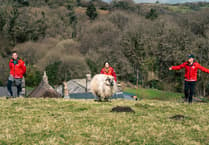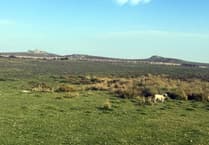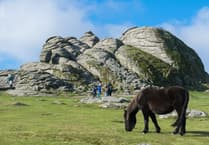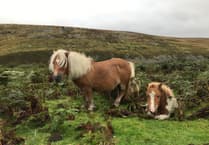An INDEPENDENT review investigating Dartmoor’s environment has found that the way the moor is managed ‘needs to change radically and urgently’.
The report, commissioned by the government and chaired by David Fursdon, began in June. It was commissioned after farmers and Natural England, the regulatory body representing Defra, clashed over grazing regulations and the environmental health of the moor.
The inquiry found that Molonia, or purple moor grass was ‘out-competing other vegetation and creating a tussocky, bleached, landscape where few animals will graze apart from a short period in late spring and early summer.’
It therefore found that ‘Dartmoor needs more cattle undertaking conservation grazing to combat the spread of Molinia.’
However, the report concluded: ‘If this isn’t successful we recognise there will be pressure to remove sheep from affected areas.’
The report acknowledged that ‘Dartmoor is a very challenging environment for Natural England to work in.’ However, it found that Natural England’s relationship with farmers had ‘completely broken down’, and that ‘local advisers have responded to this situation by becoming increasingly inward-looking and target-driven, rather than by reaching out and building effective partnerships.’
Another top priority identified by the review was the regeneration of Dartmoor’s bogs and peatlands, of which just 1% remain in good condition.
The report also mentioned the importance of Dartmoor’s iconic ponies but recognised that their future was in jeopardy. Before the review, there was a concern that removing stock from the moor would devastate pony populations, as farmers would be forced to keep more ‘productive’ animals, such as sheep and cattle instead. However, the review recommended that ponies should not be linked with other animals for the calculation of stocking rates, and ‘NE should not take actions likely to result in a reduction in their numbers.’
It was also recommended that existing agri-environment agreements should be rolled over for another year for the recommendations to be adopted and for farmers to adjust to any changes.
Helen Radmore is the Tennant Farmers Association and has farmed on southeast Dartmoor for decades. Helen said ‘For the first time in a long time it feels like those of us who live and work on Dartmoor have been listened to properly. The ‘us and them’ approach that has been perpetuated by Natural England has been called out by this report. A shared vision which respects all those with rights and responsibilities on Dartmoor is the only way forward. However, we cannot allow matters to drift.
‘Farm businesses, including my own, are being negatively impacted by the current policies and practices on Dartmoor without any benefit for the environment. Indeed, what this report makes clear is that 30 years of agri-environment policy on Dartmoor has failed. I hope that this new report marks the dawn of a new era of collaborative policy development and implementation which will allow the iconic and much-loved landscape of Dartmoor to thrive.’
Farming Minister Mark Spencer said: ‘Dartmoor cannot either stand still or retreat into its past, so it is vital that all parties take heed of the review’s recommendations so we can effectively support food production, public access and heritage on the moor whilst delivering much-needed improvements for nature.’
David Fursdon, Chair of the Review, said: ‘This is a time for those involved with Dartmoor to come together in the face of climate change and biodiversity loss to protect and enhance nature on the Moor. Commoners have a vital role to play in delivering the management and grazing that contributes to this, as do those working to re-wet the degraded peatland.
‘We are concerned that the processes around monitoring and evaluation of protected sites are too opaque for all of those who are involved in ensuring their success. We have proposed a series of changes to ways of working for the commoners, Natural England, the RPA and others, including taking decisions with a much greater clarity and transparency based on evidence and collaborative working.’
Marian Spain, Chief Executive of Natural England, said: ‘I welcome this important report and would like to thank David Fursdon, panel members and all who submitted views for their hard work. We will now work with our colleagues in Defra and the RPA, and our partners on Dartmoor, to consider the recommendations and implement the final decisions in due course.
‘We especially look forward to measures that will bring all partners around the table to find collective solutions. This will help us meet our legally binding environmental targets while properly rewarding commoners for conservation grazing, supporting nature-friendly and profitable farm businesses across Dartmoor.’







